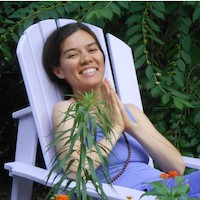“Are you happy?”
This is the question my Guru always asks when I visit the ashram.
I breathe a sigh of relief that she is not asking if I still drink coffee or if I am a moral, upstanding citizen. She does not even ask if I keep up with an asana practice or follow the yamas and niyamas.
Sometimes she asks how work is going or how my health is, but I suspect that is a ploy to get the answer to the original question—are you happy?
Yes, I am happy, thank you for asking.
I have heard her ask the question of others too. Some of us answer in a similar fashion. The first reaction is, “Yes, of course!” and then there is a pause (of seconds, hours or sometimes days) and then we come clean, divulging what our true reaction is to events going on in our lives.
Happiness and yoga are intimately related. In fact, the search for happiness may be what leads many of us to yoga in the first place. Whether we are looking for physical health, the alleviation of physical or mental discomfort, or to find God, we all seem to be searching. The classical yoga system teaches that the answers and bliss are within us and we need nothing from outside of us.
Santosha refers to contentment and is one of the 10 ethical precepts of yoga (the second niyama). Santosha is a state of being that is not dependent upon outside factors. Human nature tends to propel us outward to look for happiness but enlightened yogis throughout history have reminded us that contentment is found within by finding our highest Self.
My personal way to “go within” is to visit an ashram I love in North Carolina. At first glance it seems contradictory. If the answers are within, there is nowhere to go and nothing to do. True. But not all of us are evolved enough to go it alone—some of us like outside help. Just as not everyone can do their asana practice at home by themselves and some may want to go to class for the support of the group environment, some of us struggle to find the bliss within while alone in the confines of our living room.
Thus I regularly do retreats at an ashram to find my highest Self. I listen to the Guru speak. I watch how she moves and how she acts in my attempt to copy her. But sometimes even at a bliss-filled ashram, the crafty mind sneaks in with its tricks. If only so-and-so were here. If only I didn’t have this back injury. If only they served pie this place would be perfect!
The irony of what I learn firsthand at the ashram is that happiness will never be found outside of myself and as long as I look for the externals to be “just right,” happiness will forever be elusive. Even those things we think are under our control are not and they really just hang in the balance.
Do I get closer to God and happiness at the ashram? Definitely! But even at the ashram I must constantly check myself; an external environment does not bring bliss, a peaceful internal one does. The peaceful internal one seems to come about more easily when the externals are peaceful, but even that is not guaranteed. So when I find the internal bliss while on retreat I must then work to bring it back into the world.
I have had the blessing of coming in contact with several beings who I believe are enlightened masters. One common thread to their message seems to be that while we must do the work, we must also be happy now—in this very moment. The spiritual path is hard enough so do not add to it by relying on externals for your happiness. Perfection exists right now. My Guru says that everything is as it should be and that God’s grace is available to all of us at any moment—even in the challenges we face.
As with other aspects of our yoga practice, the more we practice santosha the easier it gets. Whether you are at the office, a tropical paradise, the site of a natural disaster, or an ashram, the mind can make the experience a heaven or hell. Make your corner of the world be a heaven. Even for those of us who have not yet reached enlightenment, we have work to do and while we do it we must try to be peaceful and content. Practice santosha—if not for your self, for your highest Self and for all those around you who might need you to be an example and beacon of light.
Are you happy? In hindsight maybe the Guru was asking me if I was keeping the yamas and niyamas! By doing my yoga practice I feel happier. The contentment found through our spiritual practice is something no one can take from us and it does not diminish or increase based on external factors. The Guru knows my answer to the happiness question before I answer it and independent of what words come out of my mouth; thus it is best for me to practice santosha and answer honestly, not in words, but in the way I live.
Relephant:
Santosha – a brief poem for commuters
Author: TIna Loos
Editor: Travis May
Photos: Wikipedia









Read 0 comments and reply